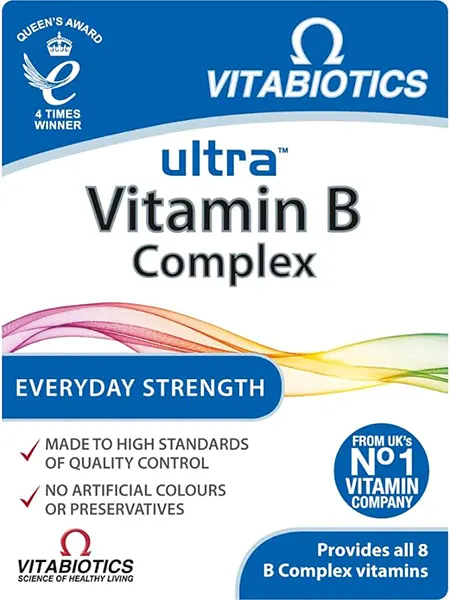This Vitamin B Complex by Vitabiotics, produced in the UK contains;
- Vitamin B1 5mg
- Vitamin B2 1.4mg
- Vitamin B3 16mg
- Vitamin B6 5mg
- Folic Acid 200μg
- Vitamin B12 50μg
- Biotin 25μg
- Pantothenic Acid 6mg
Ingredients
Tablet Ingredients: Ingredients: Bulking Agents: Dibasic Calcium Phosphate & Potato Starch, Niacin (Nicotinamide), Vitamin B12 (Cyanocobalamin [Carrier: Dibasic Calcium Phosphate]), Thiamin (Vitamin B1 as Mononitrate), Pantothenic Acid (as Calcium Salt), Vitamin B6 (Pyridoxine HCI), Tablet Coating (Hydroxypropylmethylcellulose, Propylene Glycol, Ethyl Cellulose, Colours: Titanium Dioxide, Red Iron Oxide), Sodium Starch Glycolate, Polyvinylpolypyrrolidone, Polyvinylpyrrolidone, Anti-Caking Agents: Silicon Dioxide, Magnesium Stearate & Purified Talc, Riboflavin, Folic Acid (as Pteroylmonoglutamic Acid), Biotin.
Information
The tablet is very small and easy to swallow and has no bitter taste. The dosage is to take one or two tablets per day with a drink. There are 60 tablets in a pack giving you either 1 or 2 months supply.
It’s generally recommended to take B vitamins with food. Taking them with meals can help enhance their absorption and utilization by the body.
Whilst these amounts are quite small, they are all over the RDA and so do a good job of topping up your B Vitamins.
A major benefit to this supplement is that it’s good value for money and the brand Vitabiotics is very trustworthy.
The tablets have no artificial colours, preservatives, lactose, gluten, salt or yeast. Furthermore Vitabiotics states that they haven’t been tested on animals and the supplement is made to GMP standards.
Vitamin B’s role
Vitamin B plays a crucial role in various bodily functions, including energy metabolism, nerve function, and red blood cell production.
It helps convert food into energy, supports the nervous system by aiding in the production of neurotransmitters, and is essential for the synthesis of DNA and red blood cells.
Additionally, certain B vitamins, such as B6, B12, and folate, are important for heart health and may help lower the risk of certain chronic diseases.
There can be various reasons you’re lacking in Vitamin B
- Inadequate dietary intake
- Malabsorption disorders – Celiac disease, Crohns disease etc.
- Certain medications – e.g. proton pump inhibitors
- Alcoholism
- Antibiotic side effect
- Chronic stress
- High levels of physical activity
- Pregnancy and breastfeeding
- Aging
- Specific medical conditions – kidney disease, liver disease, diabetes, autoimmune disorders
While deficiencies in specific B vitamins are not uncommon, widespread deficiency across the entire B vitamin spectrum is relatively rare in populations with access to varied and balanced diets. However, certain subgroups of the population, such as older adults, vegetarians and vegans, individuals with certain medical conditions, and those with poor dietary habits or restricted diets, may be at a higher risk of B vitamin deficiencies.
If you have a severe deficiency with constant fatigue, then you might need a higher dose to rectify it than this supplement provides, nevertheless it’s still helpful in some situations where you want to taper large doses or take a break.
Combination with other supplements
Consuming B Vitamins uses up other minerals in your body, so it’s often advised to also supplement with minerals such as magnesium, zinc, copper and iron. However you should have a blood test to determine what your mineral levels are in the first place.
On the other side, there are also various supplements that you might take that can increase your need for Vitamin B ;
- Protein supplements: Protein metabolism requires B vitamins, particularly vitamin B6, riboflavin (B2), and niacin (B3). Consuming high amounts of protein supplements may increase the body’s demand for these vitamins.
- Iron supplements: Iron supplementation may increase the need for vitamin B12 and vitamin B6, as these vitamins are involved in red blood cell formation and iron metabolism.
- Calcium supplements: Calcium supplements might interfere with the absorption of vitamin B12, so individuals taking calcium supplements may require higher intakes of vitamin B12.
- Magnesium supplements: High doses of magnesium supplements can interfere with the absorption and utilization of vitamin B6.
- Folic acid supplements: Taking folic acid supplements alone may mask a vitamin B12 deficiency, so individuals taking folic acid supplements may need to ensure adequate intake of vitamin B12.
- Fish oil supplements: Fish oil supplements may increase the body’s requirement for vitamin B6 due to increased metabolism of omega-3 fatty acids.
- Choline supplements: Choline metabolism requires certain B vitamins, including folate (B9), vitamin B6, and vitamin B12. Taking choline supplements may increase the demand for these B vitamins.
Summary
Overall I can recommend this supplement for people who need to rectify a Vitamin B deficiency, the tablets are small are easy to swallow, the brand is trustworthy, the price is good value and B Vitamins are extremely important for health, so making sure you have sufficient levels is important.









